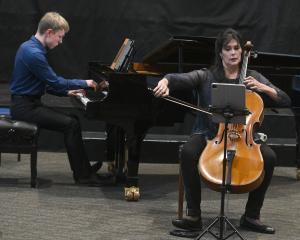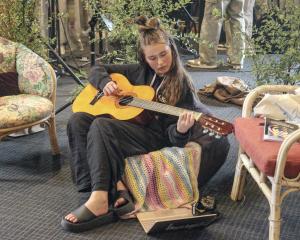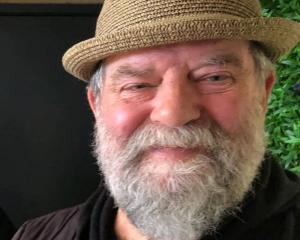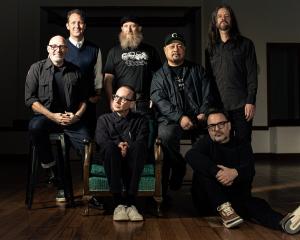
The distorted klaxon guitar of frontman Andrew Wilson opens Die!Die!Die!’s new album with an urgent message for our times. Moments later, the gunshot snap and thump of drummer Michael Prain’s rack-taut skins begin to feel for the momentum of the song. By the time Lachlan Anderson’s mile-long steel rope bassline joins, the whole enterprise is loping with an uneven but undeniable momentum across open ground.
"This is not an island anymore," Wilson’s shredded vocal caws and there’s nowhere to hide.
The song, named for that chorus line, isn’t just about the realities Aotearoa New Zealand has had to face up to these past couple of years, dragged as we have been into the one big global pandemic. That’s just part of it, Wilson says down the phone from Auckland.
"That can be on a personal level as well. If you only think about yourself you become pretty isolated and lonely."
Prioritising narrow self-interest just doesn’t cut it any more, if it ever did.
That marker down, the seventh studio album and first full-length in four years from the band that burst from the gates of Logan Park High School, Dunedin almost 20 years ago, gathers pace; Prain picking up the tempo in lockstep with Anderson, while Wilson’s viper guitar lines coil and strike, sketchy melodies leading the listener on.
"This is the best reflection of the band and our most honest record," Wilson says of This Is Not An Island Anymore, which does double duty as the album’s name.
It’s a pretty big call for an outfit — variously categorised as post-punk, noise pop, shoegaze, lo-fi and punk rock in the unceasingly furcating world of contemporary music — that’s recorded relentlessly, to not a little critical acclaim, and toured tirelessly around the globe on the back of that output for most of the millennium.
But Wilson says several things came together, despite the trying times for music and the people dedicated to it.
"This album, when we went into it, the lyrics were done, all the instruments were kind of decided and it was recorded to tape. There wasn’t really much fluffing around," Wilson says of their process.
"On the last day of recording we kind of sat around twiddling our thumbs because we had done everything and that’s quite a strange thing for our band. And it was all done within quite a short space of time, which was one thing that we really wanted to do."
It means the songs, walls of sound that they are, are uncluttered. No guitar overdubs, no Pro Tools.
"I know the record’s quite frenetic but it definitely has a bit of space as well, where we have not put anything in unnecessarily," Wilson says.
"It has made me go back and have a look at a lot of our other records as well, where maybe we spent a little bit too much time on them. Maybe we don’t need that extra harmony, we don’t need that extra guitar."
Also Key for the three-piece has been the return of bass player Anderson, who rejoined mainstays Wilson and Prain in 2018 after an absence of seven years. Wilson credits him with a leading role in the direction This Is Not An Island Anymore took.
"I think we did new things, especially with time signatures. Lachlan had a really clear vision on not wanting to have such straightforward rhythms with this album."
That aesthetic’s a prominent feature from the outset, tracks repeatedly launching rhythms that build and switch, then build again.
In a band that constructs its songs collaboratively, around Wilson’s lyrics, Anderson was given the final say on which ones made the album.

"This one, we’re all pretty happy. I don’t think it’s a perfect record by any means, but we are all pretty happy with how it was and how it’s come out."
Anderson’s return has also acted to close a loop. His departure left unfinished business that Wilson says dogged them through several recording cycles, as the band sought to prove itself again. That can finally be put in the past.
"This album, especially with Lachlan rejoining the band after being away since 2011, kind of tied up quite a lot of loose ends. It doesn’t feel like we have to fix something in the past or make up for something that we’ve done. It is quite a good feeling. I’m not going to say a final end but it does feel like we can kind of do new things now. It just feels quite different."
Most of the album was recorded at Auckland’s Roundhead studios, though the vocal was done first at Earwig on the North Shore. First choice had been a fully analogue studio in Chicago, because the plan was to record to tape. However, travel became a non-starter and Roundhead had a similar tape machine.
Other elements have coalesced to help colour the relatively sunny outlook Wilson communicates, despite inevitable frustration at the inability to play live.
After some less than satisfactory forays into the dissonant world of record labels, Die!Die!Die! are back in charge of their own affairs.
"We got our rights back to a lot of our music and we also got control of our Bandcamp back, which was amazing because that has been a huge help for us as a band — to be in charge of our own Bandcamp, putting up music and merch and things like that. What we always wanted to do but we haven’t had the means or there’s always been roadblocks. Now we look after that stuff and it has been really freeing."
Other strands of the new album’s state-of-the-nation orientation confront the allied plagues of anti-vax disinformation and shock jock rabble rousing.
Another son of the South is drawn into the band’s treatise on the latter, in the song Vanish, which name-checks radio host and Invercargill city councillor Marcus Lush and samples audio from his show — with permission.
Though Wilson is quick to clarify he doesn’t see Lush as a principal offender.
"It wasn’t actually a crack at Marcus Lush though. I think he does a great job. It was more just the culture of how you can have this festering racism and festering stuff get amplified in those sorts of spaces."
It is not all railing at the world, neither is it all more serious than it needs to be.
First single, the driving, limber Losing Sight, Keep on Kicking, about "losing yourself and finding your mauri", has been released with a video inspired by the early gore-fests of Peter Jackson’s film-making. It carries an R18 rating and its workout video gone horribly intestinal is not for the faint-hearted.
So, fans can get a YouTube fix and Wilson reports that elsewhere the band’s music is getting airplay — among other places on the radio show of former Black Flag frontman Henry Rollins.
But Die!Die!Die!’s modus operandi is to tour its music and Wilson is keen to do so again, tentative dates pencilled in for May, though by his own assessment later in the year is more likely.
"I’ll be a pretty happy guy if we can just get to play some shows," he says.
The album
Die!Die!Die!’s new album, This Is Not An Island Anymore, is out now.













